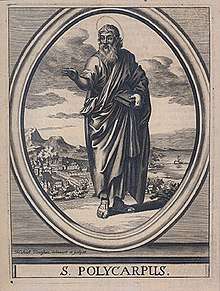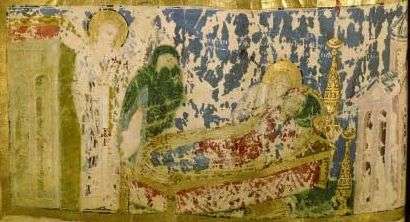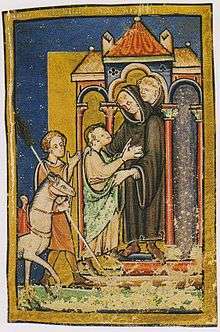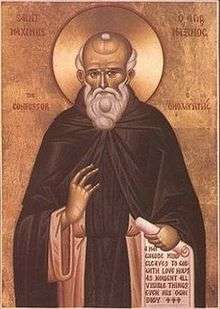February 23 (Eastern Orthodox liturgics)
February 22 - Eastern Orthodox liturgical calendar - February 24
All fixed commemorations below are observed on March 8 (March 7 on leap years) by Eastern Orthodox Churches on the Old Calendar.[note 1]
For February 23rd, Orthodox Churches on the Old Calendar commemorate the Saints listed on February 10.
Saints
- Hieromartyr Polycarp of Smyrna, Bishop of Smyrna (167)[1][2][3][4][note 2]
- Holy 73 Martyrs of Sirmium, under Diocletian (303)[5][note 3]
- Martyr Clement, by the sword.[3][7]
- Martyr Thea, by the sword.[3][8]
- Venerable Gorgonia the Righteous (370), sister of St. Gregory the Theologian.[1][3][9][10][note 4]
- Saint Alexander, founder of the Monastery of the Unsleeping Ones, Constantinople (430)[1][11][12][13] (see also: January 15, July 3)
- Saints John,[14] Antioch, Antoninus,[15] Moses,[3][16][17] Zebinas,[18] Polychronius,[19] Moses (another),[20] and Damian,[3][21][22] ascetics near Cyrrhus in the Syrian desert (5th century)[1][23][note 5]
- Saint John Theristes ("the Harvester") of Stylos in Calabria (9th or 11th century)[1][11][24][note 6][note 7] (see also: February 24 )
Pre-Schism Western saints
- Saint Martha, a virgin-martyr beheaded in Astorga in Spain under Decius (251)[28][29][note 8]
- Saint Polycarp, a priest in Rome noted for ministering to those in prison for their faith (c. 300)[28][note 9]
- Saint Romana, a virgin born in Rome who reposed at the age of eighteen while living as an anchoress in a cave on the banks of the Tiber in Italy (324)[28][note 10]
- Saints Syncrotas, Antigonus, Rutilus, Libius, Senerotas and Rogatianus, martyrs at Sirmium in Pannonia (4th century)[28]
- Saint Florentius of Seville, Confessor, a saint much venerated in Seville in Spain (c. 485)[6][28]
- Saint Felix of Brescia, twentieth Bishop of Brescia (c. 650)[6][28][note 11]
- Saint Jurmin, an East Anglian prince, son or nephew of King Anna of East Anglia (653)[28][30][note 12]
- Saint Boswell (Boisil), Abbot of Melrose Abbey in Scotland (c. 661)[28][31][note 13] (see also: February 24)
- Saint Mildburga (Milburgh), Abbess of Wenlock Priory (715)[6][11][28][30][32][note 14]
- Saint Medrald (Mérald, Méraut), a monk at Saint-Evroult (Ebrulfus) of Ouche in France, who later became Abbot of Vendôme (c. 850)[28]
- Saint Willigis, Archbishop of Mainz (1011)[28][note 15]
Post-Schism Orthodox saints
- Venerable Damian of Esphigmenou Monastery, on Mount Athos (1280)[1][11][33][34]
- Saint Cosmas of Zograf Monastery, Mount Athos (1281)[1][11]
- Saint Moses of White Lake Monastery, monk (1480)[1][11][35]
- New Monk-martyr Damian of Philotheou and Kissavos, at Larissa (1586)[1][3][11][36]
- New Hieromartyr Lazarus of the Peloponnese (c. 1618)[1][11]
- Venerable Polycarp of Bryansk, monk of Bryansk (1620-1621)[1][37][note 16]
- Saint Nazarius, Abbot of Valaam Monastery (1809)[1][11]
- Saint Seraphim (Zenobius), Schema-Metropolitan of Tetritskaro, Georgia, monk of Glinsk Monastery (1985)[1]
New martyrs and confessors
- New Hieromartyr Paul Kushnikov, Priest (1918)[38][39]
- New Hieromartyr Michael Edlinsky, Archpriest, of Kiev (1937)[1][note 17] (see also: November 17)
- New Hieromartyr Alexis Nikolsky, Priest (1938)[11][13]
- New Hieromartyr Nicholas Dimitrov, Priest (1938)[11][13]
- New Hieromartyr Michael Razhkin, Priest (1938)[13]
- Martyr Sergius Borodavkin (1938)[11][13]
- New Hieromartyr Sergius (Bukashkin), Hieromonk, of Novo-Alexandrovka, Moscow (1938)[1]
- New Hieromartyr Antipas (Kyrillov), hieromonk, of Tatarintsevo, Moscow (1938)[1]
- New Hieromartyr Philaret (Pryakhin), Abbot, of Trubino, Tver (1942)[1]
Other commemorations
- Repose of Archimandrite Agapit (Belovidov) of Optina Monastery (1922)[1]
- Repose of Elder Sabbas (Stavrobouniotes) of Cyprus (1985)[1]
- Uncovering of the relics (1998) of Blessed Matrona of Moscow (1952)[13][note 18]
Icon gallery
 Hieromartyr Polycarp of Smyrna.
Hieromartyr Polycarp of Smyrna. St. Gorgonia.
St. Gorgonia. Boisil greets Cuthbert at Melrose Abbey.
Boisil greets Cuthbert at Melrose Abbey. St. Mildburga's Priory, Much Wenlock.
St. Mildburga's Priory, Much Wenlock.
Notes
- The notation Old Style or (OS) is sometimes used to indicate a date in the Julian Calendar (which is used by churches on the "Old Calendar").
The notation New Style or (NS), indicates a date in the Revised Julian calendar (which is used by churches on the "New Calendar"). - Name days celebrated today include:
- Polycarp (Πολύκαρπος).
- "At Sirmium, St. Sirenus, monk and martyr. By order of the emperor Maximian, he was arrested and beheaded, for confessing that he was a Christian. In the same place, the birthday of seventy-two holy martyrs, who ended the combat of martyrdom in that city, and took possession of the everlasting kingdom."[6]
- Gregory the Theologian eulogized Saint Gorgonia as "The Diamond of Her Sex".
- Name days celebrated today include:
- Polychronius (Πολυχρόνιος)
- Polychronia (Πολυχρονία).
- Of Calabrian parentage, he was born in Sicily, where his mother had been taken as a slave by the Saracens. He managed to escape to Calabria while still a child and there became a monk. Theristos, meaning harvester, refers to a miraculous harvest reaped by the saint.[25]
In December 1994, the Regional Council of Calabria unanimously declared the Byzantine area located between the rivers Stilaro and Aces sacred, in order to allow for the re-establishment of Orthodox monasticism. Thus the Monastery of San Giovanni Theristis was founded. On 24 February 1995, the City of Bivongi officially handed over the Monastery to the Greek Orthodox Archdiocese of Italy, thus contributing to the restoration of the ancient ties made between monasticism on Athos and Italo-Greek monasticism. From 1994 until mid-2008 Greek-Orthodox monks from Mount Athos, Greece were living in the monastery praying, studying and working. On July 2008, the city council took the monastery from the Ecumenical Patriarchate. Currently the monks residing there are of the Patriarchate of Romania.[26] - The Roman Martyrology (1916 English edition) has the following entry under June 24: "At Stilo, in Calabria, St. John, surnamed Therestus, distinguished for his fidelity to the monastic rule, and for his sanctity."[27]
- "In the city of Astorga, St. Martha, virgin and martyr, under the emperor Decius, and the proconsul Paternus."[6] Her relics are enshrined at Ribas de Sil and Ters.
- "At Rome, St. Polycarp, priest, who with blessed Sebastian converted many to the faith of Christ, and by his exhortations led them to the glory of martyrdom."[6]
- "At Todi, St. Romana, virgin, who was baptized by pope St. Sylvester. She led a heavenly life in caves and dens, and wrought glorious miracles."[6]
- He was bishop for over forty years during which time he was occupied in fighting Arianism and other heresies.
- His relics were enshrined at Bury St Edmunds in England.
- Saints Cuthbert and Egbert were among his monks. Both admired him greatly, as did St Bede. His favourite reading was the Gospel of St John.
- The elder sister of St Mildred of Minster-in-Thanet in England, and the second Abbess of Wenlock. Archbishop Theodore consecrated her as a nun. She had the gift of miracles and healing of the blind and lepers, as well as power over birds and the natural world.
- The son of a wheelwright, he became a priest at Hildesheim in Germany. Two years later he became Archbishop of Mainz. Although a statesman, Willigis was first and foremost a churchman and always remained humble and charitable to others.
- See: (in Russian) Поликарп Брянский. Википедии. (Russian Wikipedia).
- See: (in Ukrainian) Едлінський Михайло. Вікіпедії. (Ukrainian Wikipedia).
- This celebration was entered into the Menologion according to the resolution of the Holy Synod of the Russian Orthodox Church on July 16, 2013.[13]
gollark: i am usingcrypto graphy™
gollark: <@543131534685765673> 2fd575c5d947cae5b79f286a08991fab04c65636c6cf6a3b7218f0858740b27a09d5d31b1d65c3ab7b356b134298ef9c13a475eb4e00b81d4dfdc8228150969e
gollark: 565b06ade1fa5f9cb79d026f977d2bb9492605a28e3fa9c968a830d6bdae974b2d46e6ac694abade7567c8e830db2956189a237b24bfe4821df5c984e9ff8497
gollark: Maybe you could write it down using minoteaur™, coming soon.
gollark: You can write it down so you don't forget!
References
- February 23 / March 8. Orthodox Calendar (PRAVOSLAVIE.RU).
- Great Synaxaristes: (in Greek) Ὁ Ἅγιος Πολύκαρπος ὁ Ἱερομάρτυρας Ἐπίσκοπος Σμύρνης. 23 Φεβρουαρίου. ΜΕΓΑΣ ΣΥΝΑΞΑΡΙΣΤΗΣ.
- (in Greek) Συναξαριστής. 23 Φεβρουαρίου. ECCLESIA.GR. (H ΕΚΚΛΗΣΙΑ ΤΗΣ ΕΛΛΑΔΟΣ).
- Hieromartyr Polycarp the Bishop of Smyrna. OCA - Lives of the Saints.
- Great Synaxaristes: (in Greek) Οἱ Ἅγιοι Ἑβδομήντα Τρεῖς Μάρτυρες. 23 Φεβρουαρίου. ΜΕΓΑΣ ΣΥΝΑΞΑΡΙΣΤΗΣ.
- The Roman Martyrology. Transl. by the Archbishop of Baltimore. Last Edition, According to the Copy Printed at Rome in 1914. Revised Edition, with the Imprimatur of His Eminence Cardinal Gibbons. Baltimore: John Murphy Company, 1916. pp. 56-57.
- Great Synaxaristes: (in Greek) Ὁ Ἅγιος Κλήμης ὁ Μάρτυρας. 23 Φεβρουαρίου. ΜΕΓΑΣ ΣΥΝΑΞΑΡΙΣΤΗΣ.
- Great Synaxaristes: (in Greek) Ἡ Ἁγία Θεὴ ἡ Μάρτυς. 23 Φεβρουαρίου. ΜΕΓΑΣ ΣΥΝΑΞΑΡΙΣΤΗΣ.
- Great Synaxaristes: (in Greek) Ἡ Ἁγία Γοργονία ἀδελφὴ τοῦ Ἁγίου Γρηγορίου τοῦ Θεολόγου. 23 Φεβρουαρίου. ΜΕΓΑΣ ΣΥΝΑΞΑΡΙΣΤΗΣ.
- St Gorgonia, sister of St Gregory the Theologian. OCA - Lives of the Saints.
- March 8 / February 23. Holy Trinity Russian Orthodox Church (A parish of the Patriarchate of Moscow).
- Venerable Alexander the founder of the Monastery, of the “Unsleeping Ones”. OCA - Lives of the Saints.
- (in Russian) 23 февраля (ст.ст.) 8 марта 2014 (нов. ст.). Русская Православная Церковь Отдел внешних церковных связей. (DECR).
- Venerable John, Ascetic of the Syrian Deserts. OCA - Lives of the Saints.
- Venerable Antiochus, Ascetic of the Syrian Deserts. OCA - Lives of the Saints.
- Great Synaxaristes: (in Greek) Οἱ Ὅσιοι Ἰωάννης, Ἀντίοχος, Ἀντωνίνος καὶ Μωϋσῆς. 23 Φεβρουαρίου. ΜΕΓΑΣ ΣΥΝΑΞΑΡΙΣΤΗΣ.
- Venerable Moses, Ascetic of the Syrian Deserts. OCA - Lives of the Saints.
- Venerable Zebinas, Ascetic of the Syrian Deserts. OCA - Lives of the Saints.
- Venerable Polychronius, Ascetic of the Syrian Deserts. OCA - Lives of the Saints.
- Venerable Moses, Ascetic of the Syrian Deserts. OCA - Lives of the Saints.
- Great Synaxaristes: (in Greek) Οἱ Ὅσιοι Ζεβινᾶς, Πολυχρόνιος, Δαμιανὸς καὶ Μωϋσῆς. 23 Φεβρουαρίου. ΜΕΓΑΣ ΣΥΝΑΞΑΡΙΣΤΗΣ.
- Venerable Damian, Ascetic of the Syrian Deserts. OCA - Lives of the Saints.
- Rev. Sabine Baring-Gould (M.A.). "SS. ZEBINAS, POLYCHRONIUS, MOSES, AND DAMIAN, HH. (5TH CENT.)." In: The Lives of the Saints. Volume the Second: February. London: John C. Nimmo, 1897. pp. 376-377.
- Ο ΟΣΙΟΣ ΙΩΑΝΝΗΣ ο θεριστής (+ 11ος αι.). Εορτάζοντες την 23ην του μηνός Φεβρουαρίου. ΗΜΕΡΟΛΟΓΙΑΚΟ ΕΟΡΤΟΛΟΓΙΟ.
- February 24. Latin Saints of the Orthodox Patriarchate of Rome.
- (in Italian) Monastero San Giovanni Theristis. Ortodossia Cristiana. Retrieved: 13 November 2014.
- The Roman Martyrology. Transl. by the Archbishop of Baltimore. Last Edition, According to the Copy Printed at Rome in 1914. Revised Edition, with the Imprimatur of His Eminence Cardinal Gibbons. Baltimore: John Murphy Company, 1916. pp. 183-184.
- February 23. Latin Saints of the Orthodox Patriarchate of Rome.
- Rev. Sabine Baring-Gould (M.A.). "S. MARTHA, V. M. (A.D. 251.)." In: The Lives of the Saints. Volume the Second: February. London: John C. Nimmo, 1897. p. 360-361.
- Rev. Richard Stanton. A Menology of England and Wales, or, Brief Memorials of the Ancient British and English Saints Arranged According to the Calendar, Together with the Martyrs of the 16th and 17th Centuries. London: Burns & Oates, 1892. p. 81-82.
- Very Rev. John O'Hanlon. "Article X.—St. Boisil, Abbot of Melrose, Scotland. [Seventh Century]." In: Lives of the Irish Saints: With Special Festivals, and the Commemorations of Holy Persons. VOL. II. Dublin, 1875. pp. 686-688.
- Rev. Sabine Baring-Gould (M.A.). "S. MILBURGH, V. ABSS. (7TH CENT.)." In: The Lives of the Saints. Volume the Second: February. London: John C. Nimmo, 1897. pp. 382-386.
- Great Synaxaristes: (in Greek) Ὁ Ὅσιος Δαμιανὸς ὁ Ἐσφιγμενίτης. 23 Φεβρουαρίου. ΜΕΓΑΣ ΣΥΝΑΞΑΡΙΣΤΗΣ.
- Venerable Damian of Esphigmenou of Mt Athos. OCA - Lives of the Saints.
- Great Synaxaristes: (in Greek) Ὁ Ὅσιος Μωϋσῆς ἐκ Ρωσίας. 23 Φεβρουαρίου. ΜΕΓΑΣ ΣΥΝΑΞΑΡΙΣΤΗΣ.
- Monkmartyr Damian of Philotheou. OCA - Lives of the Saints.
- Venerable Polycarp of Briansk. OCA - Lives of the Saints.
- RUSSIAN SYNOD ADDS FOUR NAMES TO SYNAXIS OF NEW MARTYRS AND CONFESSORS. Orthodox Christianity. Moscow, April 5, 2019.
- (in Russian) ЖУРНАЛЫ заседания Священного Синода от 4 апреля 2019 года. Русская Православная Церковь, Официальный сайт Московского Патриархата (Патриархия.ru). 4 апреля 2019 г. 15:00.
Sources
- February 23 / March 8. Orthodox Calendar (PRAVOSLAVIE.RU).
- March 8 / February 23. Holy Trinity Russian Orthodox Church (A parish of the Patriarchate of Moscow).
- February 23. OCA - The Lives of the Saints.
- The Autonomous Orthodox Metropolia of Western Europe and the Americas (ROCOR). St. Hilarion Calendar of Saints for the year of our Lord 2004. St. Hilarion Press (Austin, TX). p. 17.
- The Twenty-Third Day of the Month of February. Orthodoxy in China.
- February 23. Latin Saints of the Orthodox Patriarchate of Rome.
- The Roman Martyrology. Transl. by the Archbishop of Baltimore. Last Edition, According to the Copy Printed at Rome in 1914. Revised Edition, with the Imprimatur of His Eminence Cardinal Gibbons. Baltimore: John Murphy Company, 1916. pp. 56–57.
- Rev. Richard Stanton. A Menology of England and Wales, or, Brief Memorials of the Ancient British and English Saints Arranged According to the Calendar, Together with the Martyrs of the 16th and 17th Centuries. London: Burns & Oates, 1892. p. 81-82.
Greek Sources
- Great Synaxaristes: (in Greek) 23 ΦΕΒΡΟΥΑΡΙΟΥ. ΜΕΓΑΣ ΣΥΝΑΞΑΡΙΣΤΗΣ.
- (in Greek) Συναξαριστής. 23 Φεβρουαρίου. ECCLESIA.GR. (H ΕΚΚΛΗΣΙΑ ΤΗΣ ΕΛΛΑΔΟΣ).
Russian Sources
- (in Russian) 8 марта (23 февраля). Православная Энциклопедия под редакцией Патриарха Московского и всея Руси Кирилла (электронная версия). (Orthodox Encyclopedia - Pravenc.ru).
- (in Russian) 23 февраля (ст.ст.) 8 марта 2014 (нов. ст.). Русская Православная Церковь Отдел внешних церковных связей. (DECR).
This article is issued from Wikipedia. The text is licensed under Creative Commons - Attribution - Sharealike. Additional terms may apply for the media files.

